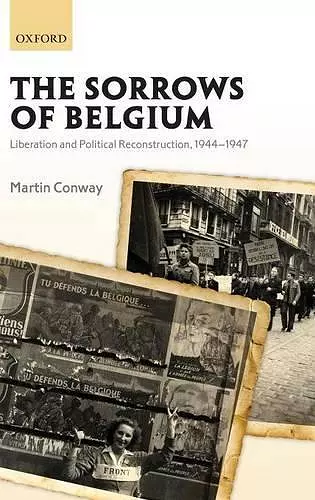The Sorrows of Belgium
Liberation and Political Reconstruction, 1944-1947
Format:Hardback
Publisher:Oxford University Press
Published:12th Jan '12
Currently unavailable, and unfortunately no date known when it will be back

The liberation of Belgium by Allied troops in September 1944 marked the end of a harsh German Occupation, but also the beginning of a turbulent and decisive period in the history of the country. There would be no easy transition to peace. Instead, the rival political forces of King Leopold III and his supporters, the former government in exile in London, and the Resistance movements which had emerged during the Occupation confronted each other in a bitter struggle for political ascendancy. The subsequent few years were dominated by an almost continual air of political and social crisis as Resistance demonstrations, strikes, and protests for and against the King appeared to threaten civil war and the institutional dissolution of the country. And yet by 1947 a certain stability had been achieved: the Resistance groups had been marginalised, the Communist Party was excluded from government, the King languished in unwilling exile in Switzerland, and, most tangibly, the pre-war political parties and the parliamentary political regime had been restored. In this substantial contribution to the history of the liberation era in Europe, Martin Conway provides the first account, based on substantial new archival material, of this process of political normalisation, which provided the basis for the integration of Belgium into the post-war West European political order. That success, however, came at a cost: the absence of any substantial political reform after the Second World War exacerbated the tensions between the different social classes, linguistic communities, and regions within Belgium, providing the basis for the gradual unravelling of the Belgian nation-state which occurred over the second half of the twentieth century.
The authors goal is to explain this seemingly paradoxical outcome of almost a decade of political and social turmoil. Based on a profound knowledge of Belgian historiography (much of it unknown internationally since written in Dutch and French) and on the critical exploration of an important number of new edited and unedited sources, Martin Conway succeeds in this ambition. * Antoon Vrints, European History Quarterly *
In this excellent book, Martin Conway asks how Belgium, a nation so sharply divided along linguistic, political, class, and religious lines, managed not only to survive the shocks of World War II but to emerge from the war years largely unchanged in its basic political structures. * William I. Hitchcock, American Historical Review *
ISBN: 9780199694341
Dimensions: 241mm x 162mm x 29mm
Weight: 784g
426 pages